- Homepage
- Our green garden
Our green garden
Our green garden is just one family's journey to grow organic-food. It is a series of blogs printed in the local newspaper, the Witness over a period of years.
Many years ago when told by a friend with a serious malignancy that her doctor said it is no longer if but when we will get cancer, we decided it was time to start growing our own fruit and vegetables; with no poisonous-sprays and using only natural fertilisers.
It has been an epic-journey, fascinated by the dictum of Hippocrates in which he states "let your food be your medicine;" is a life largely without pain and drugs really possible? Yes, sirree, it certainly is; much to big pharma's discontent.
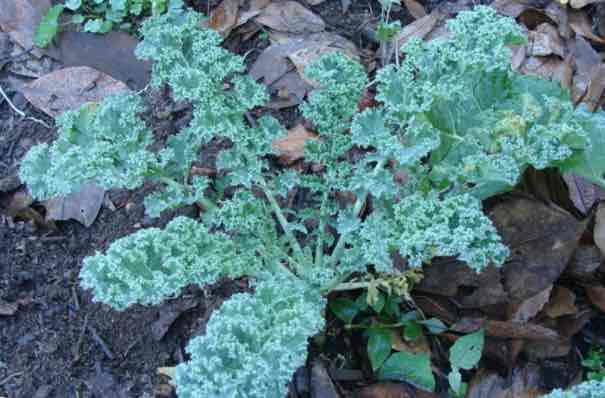
One of our everlasting kale plants is at least five-years old; whilst the leaves are much smaller now it provides us with fresh, organic greens every single day.
"The average elderly patient is taking more than five prescription medications; the mean nursing-home person is being given seven drugs daily."
- HSC Live
The Greens
Our green gardens will of course all be quite different in many respects. They will reflect our own particular issues and needs to improve our well-being; and in fact our personalities. Some will be neat and tidy; others will have crooked rows with a continuing war against a profusion of weeds.
Some will have serfs who do much of the physical-work. Other gardeners don't mind cracked feet and broken fingernails; and will weed and barrow the compost themselves.
"What if a walk in a green environment could reshape brains, recalibrate sense of time and stave off mental health conditions? If the research trends are true, doctors might soon find themselves writing prescriptions of 20 minutes of nature per day."
- Dr William Bird, MD, MBE
My own issue was a seriously lazy colon. I still have strong recollections of enemas as a child; and a life-long struggle with constipation with all its attendant difficulties. Yes, prunes helped as did beetroot, two of my mainstays; but eventually I discovery that greens at least twice, and preferably three times a day would sort out all my problems.
Now visits to the toilet are no more than two or three minute affairs; I am regular as clockwork. I cannot overemphasize what a relief it has been; literally a life-changer. It's all thanks to the fibre and perhaps other phytonutrients in the greens and other foods growing in our garden.
Chronic constipation is one of the risk factors of Parkinson's Disease; being constantly gummed up for so many years has left me with a worrying tremor in my right hand. Luckily the L-dopa from our broad beans keeps it well under control; the only plant with pharmaceutical amounts of the nutrient.
A huge scary rectal-bleed that lasted several weeks was the final push. Now we have Eggs Hilton for breakfast, a salad for lunch and often kale or broccoli for supper; end of problem.
Completely over the top I hear you thinking but a whole lot better than bad news after yet another battle with MoviPrep Sebastian Vettle's exhaust. Those of you who have had a colonoscopy will know what I am talking about.
Macular degeneration
There were other unexpected benefits such as a visit to the optician. After a long examination, he remarked, "you eat a lot of greens, don't you?" I was astonished; how on earth did he know, just by looking in my eyes?
Eat your greens is a plea to those who wish to avoid two of the chief causes of blindness in old-age.
Beekeeping
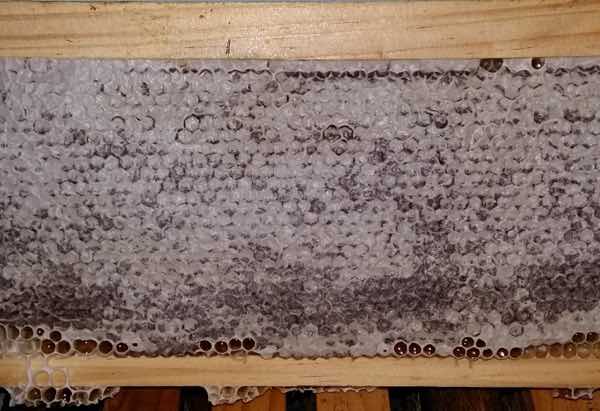
Making sure we get good honey is part of our strategy; this page is about the natural crystallisation process that occurs in supersaturated solutions.
Crystallised and creamed honey may look the same in the jar but really they are quite different; the latter is lovely but could be adulterated with high-fructose corn syrup. No food company or bottler today is to be completely trusted; buyer beware.
Who will save the bees is an oft heard cry; one in four mouthfuls of our food is pollinated by them. It's up to each of us to do our small bit for insects in general; otherwise our grandchildren will starve.
Here are five reasons why you should perhaps consider starting beekeeping. It fits totally in with our Cyan Zone philosophy; caring for self and the planet.
Eyes
Ask any gardener and they will tell you that greens that have been freshly-picked are vastly different to those harvested and sold several days later in the supermarket.
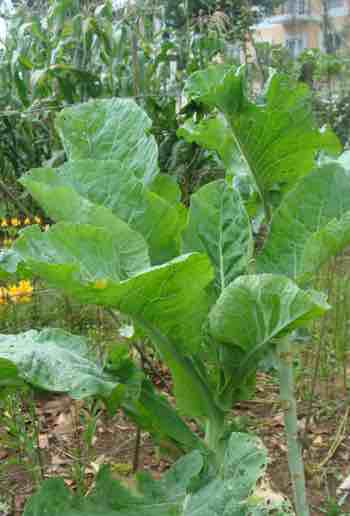
The chief causes of blindness are macular degeneration and glaucoma[1]; and a vitamin A deficiency in children. All three are very difficult for the individual to detect until it is already
too late. It is estimated that 5 to 10 million Americans are needlessly
unable to see and many more are partially-sighted; simply because of a
deficiency of two phytonutrients. Do you know what they are?
Enjoy your greens for your eyes' sake.
Actually it now appears that L-dopa is also important for our eyes; the only ready natural source is by growing broad beans. You are most unlikely to find them in the local greengrocer; they are finicky but not difficult to rear yourself.
"Gardeners have a readily available food supply with healthy options, making it simpler for those who want to move towards better dietary patterns."
- adapted from Dr Alice Lichtenstein, Friedman School of Nutrition Science
The chief cause of blindness in children is a vitamin A deficiency. This astonishing butternut harvest, rich in beta-carotene would emphatically prevent it[2].
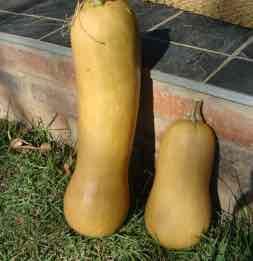
So would a plateful daily of 100% wholegrain yellow grits; again you won't find it on the typical grocery store shelves. Food manufacturers are primarily interested in the bottom line, not our health. There is little profit in unrefined meal.
Compost heaps in late winter are most easily worked before the spring-rains when the humus is still light and dry.
Dig for dignity is our cry; and a susu a day keeps hunger at bay.
You cannot grow vegetables like these without irrigation. The frustration in South Africa is the grave shortage of water and electricity services.
It is borne out by the oft-heard lament, where is our water?
Is it the state's job to supply water or should we be harvesting the rain and storing it in tanks? And underground reservoirs that will keep it icy-cold.
Lettuce
You will see many salads being advertised as free of lettuce, simply because folk abhor wilted and stale greens. Unfortunately they usually substitute it with a refined-starch like white rice which is very fattening.
Little garden patches show the way to growing lettuce and other greens.
A plain salad can be rather boring; there is no better way to spice it up than with something like shallots or chives. If you plant sprouting onions in your green garden you will never be disappointed.
Legumes
Protein forms the building blocks of our bodies, made up of more than twenty so-called amino acids; nine of them are essential. If we do not get them from our food we get a serious disease called kwashiorkor. It is a terminal condition of malnutrition.
All of them are found in meat so omnivores have no need for concern. However, vegans have to be very sure that they get an adequate supply of all of these essential amino-acids from legumes which are the main plant source of protein; to which we would add grains, seeds and nuts.
Broad beans also known as favas
The broad bean is the only plant-based protein fount that contains all nine "essential" amino acids; it is absolutely vital we consume them daily. It is also the only natural source of L dopa, the precursor of the happy hormone. The risk factors of Parkinson's Disease are so important to consider; the prevalence is growing in leaps and bounds, far beyond expectations.
How I look forward to the broad-bean season; it means a great reduction in the tremor in my right hand. It's all about dopamine.
We are on the lookout for broad bean entrepreneurs who will grow seedlings to supply the ever increasing number of people suffering from Parkinson's disease.
Freezing broad beans for the whole year is part of our philosophy of sustainable food.
Of course we have many other beans and peas growing too for vegetable protein; we have modeled our green home on the Blue Zone people where meat is certainly not eaten daily. Vigorous, strong longevity is the norm in these five parts of the world.
LIma beans
Another great favourite is the butter bean, also known as a lima; they need a trellis of sorts to grow on.
Our homemade hummus with lemon pulp is a staple in our family; we enjoy it virtually every day with a fresh, green salad.
Midwinter lightning and hail also bring nitrogen for our plants; unless the destruction is great, the improvement in the greenery is almost immediate. The rain with the dissolved mineral is most welcome in the midst of the long dry-season.
But it was only after I started keeping chickens that I realised that my wife is a racist.
Green vs dried beans
There are some who believe that dried beans are superior because of an apparent much larger amount of protein, vitamins and minerals. However they are obviously unaware of the water content in their calculations; both have value.
We prefer sprouting those that are dried; the nutrients increase many times.
We enjoy both but for choice the nutritional value of green beans for us is the overall winner; but we're not running down those that have been dried.
Starches
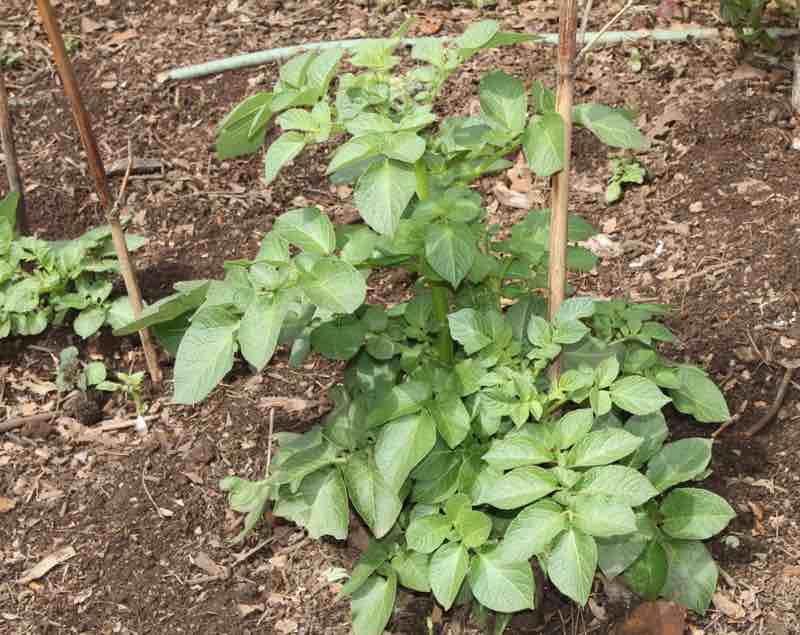
There is much controversy these days about how obese carbs make us; it is partly true but also completely false. We continue to grow our own food; fresh from the garden even potatoes do not alarm us because of their lower starch content.
How can that be? It's a half truth. It is the refined carbohydrates that make us fat and give us type-2 diabetes, not whole starches.
So I have no hesitation of recommending that you plant old potatoes in your green garden, especially if they have gone soft; or are starting to sprout. New spuds are a treat and have a much lower glycemic-index than those from cold storage; they are high in resistant starch that is not digested producing glucose.
One of the end of winter chores is to get holes dug with plenty of compost; and we like to stake and tie our potatoes. Keeping the haulm off the ground makes it simpler to heap them up; and they are easier to find once the plant has died back. The chats will go in once the danger of frost is over.
These confessions of a waste-picker tell where the seed potatoes came from.
The magnificent mealie is a staple for three months in the summer, providing a whole grain with more nutritious starch. It's the refined carbs that do so much damage to our blood vessels. We prefer the yellow varieties for their beta-carotene content.
Carbs galore considers the confusions and contradictions around starches in these times with keto diets being the rave for weight loss.
Onions
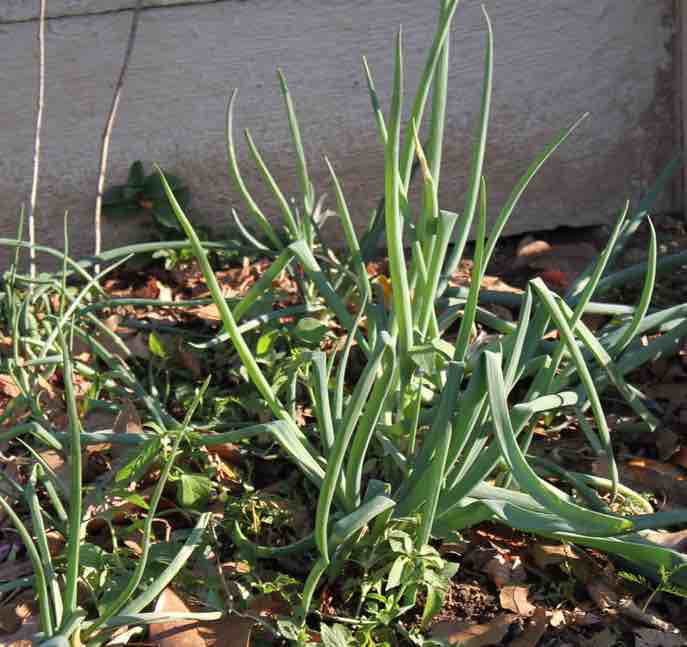
The onion family is rich in three very important phytochemicals that researchers have shown help prevent disease and promote wellness; and they taste pretty darn good. Our climate here is not ideal but we have had great success when we plant sprouting onions.
Fruit all year round
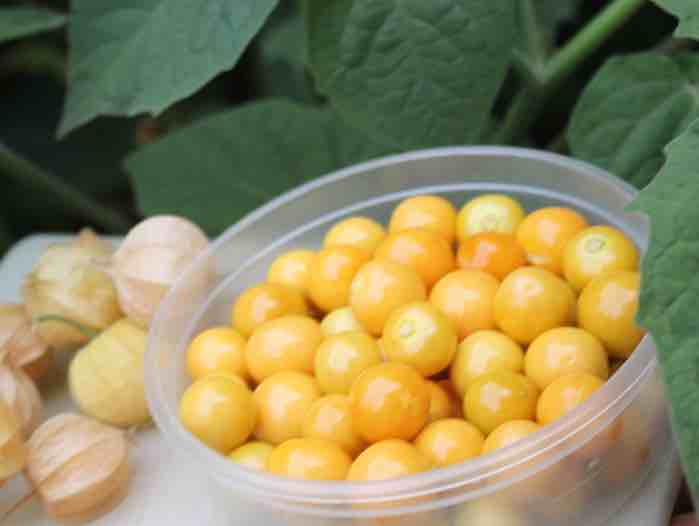
Fresh fruit all year round is one of the great blessings from our green garden. Obviously not to be had in Chicago or Klimmen in the Netherlands where we lived for many years but in the temperate climate of the Midlands of South Africa there are mulberries, avocados and citrus; and a dozen others to be enjoyed.
The whole subject of invasive alien species should be considered. Gooseberries will spread very quickly over your whole garden; and your neighbour may be grumpy.
Hunger
Serious hunger is a serious threat to many parts of the world since the pandemic; people are out of work. It will not be long before society is faced with the prospect of civil unrest on a scale not seen for a long time.
Whilst food prices in South Africa scream ever upwards it's more than possible to grow a mountain of nutritious fruit and veggies in your own garden.
And despite many of the restrictions having been lifted, the problem is getting worse not better. Even fewer buses carrying folk to work are running.
“Hunger is not a natural phenomenon. It is a man-made tragedy. People do not starve because there is not enough food to eat. They are famished because the system which delivers it from the fields to our plates is broken.”
- Desmond Tutu, Nobel Peace Prize winner
Our green garden supplies us with a pile of food; it is incredible just how much we are able to share with others. Can you imagine trying to eat 150 butternut, literally a ton of potatoes and thousands of peppadews?
Let's talk about hunger and not be ostriches, thinking it will not affect us. Today even if all the supermarkets were to close, with some bartering with fellow gardeners and farmers we would survive.
Just this week half a ton of non-GM maize has arrived; our honey will be part of the trade. There should be enough unrefined starch for both us and the hens for a whole year; and plenty for the poor. And we are counting on another mealie crop next summer from our green garden.
"The United Nations tallies up that around 235 million people worldwide needed humanitarian aid last year; and that this number is predicted to rise to 274 M by the end of 2022. Globally, that’s one in 28 folk. Hunger is rampant and spreading."
- Green Times
This prediction was made before the start of hostilities in the bread basket of Eastern Europe.
Chew your food thoroughly; it stimulates the production of the hormone called leptin, signalling to the brain when you've had enough to eat.
Spring time
Spring is a season of joy; it's a time to sow, waiting for Piet to return from Central Africa for the first mealies. A host of seeds such as butternut, many different greens and peppers are just waiting for you to pop them into your green garden.
By summer you will have so much food to eat and share that it will astonish you.
Trees
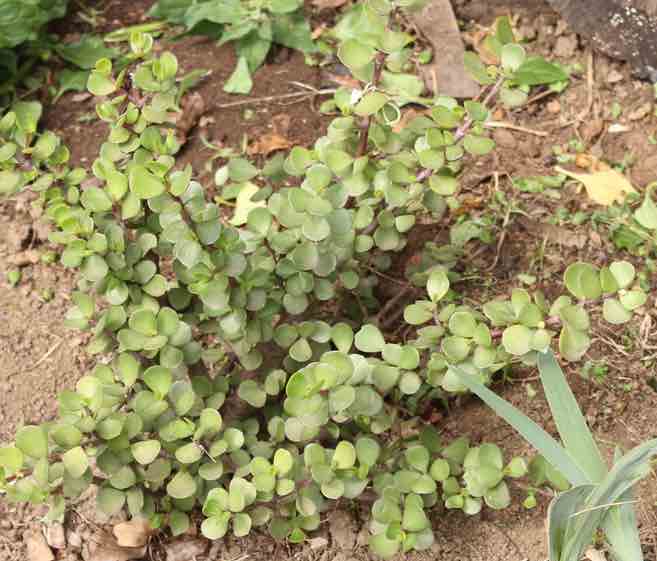
Trees give to our green garden something immeasurable yet sacred; it's indefinable but you notice the lack of tranquility the moment your enter a property that has none. We have two that are very old, a Liquid Amber and a Tulip; both are nearing one-hundred by my best reckoning.
And of course a great many smaller trees. Two years ago we made the decision to join the carpet South Africa with Spekboom movement; this little gem is indigenous and produces a great abundance of nectar for the bees.
Worm farms
Worm farms are really just an accelerated compost heap; with nothing else to do in the confined space other than eat and copulate the wrigglies proliferate at an incredible rate.
Water is the greatest enemy of the worm farm; a secure lid is vital.
Our green garden
Our green garden is completely dependent on compost heaps and worm farms for fertiliser and rainwater harvesting for irrigation. I never realised until years later that our parents were teaching their children to fish without our even knowing it.
Worm farms and the black plague takes us back to the importance of dealing with our kitchen waste sensibly.
We do all the hard work; lucky enough not to have a gardener.
Coffee grounds are wonderful in your compost heap; they are very rich in nitrogen.
These musings from the summer vegetable garden bring great tidings; not just a wonderful feast but also a thankful
heart to God. The table is laden with good food and my cup runneth over
with Catawba grape honey mead.
Water
Green gardening is very difficult without a reliable source of cheap water. Our solution was to build an underground tank. Another alternative is to turn your swimming pool into a reservoir.
The extraordinary rise in the price of water in South Africa has meant that maintaining swimming pools is no longer viable for many homeowners; some are turning them into underground reservoirs.
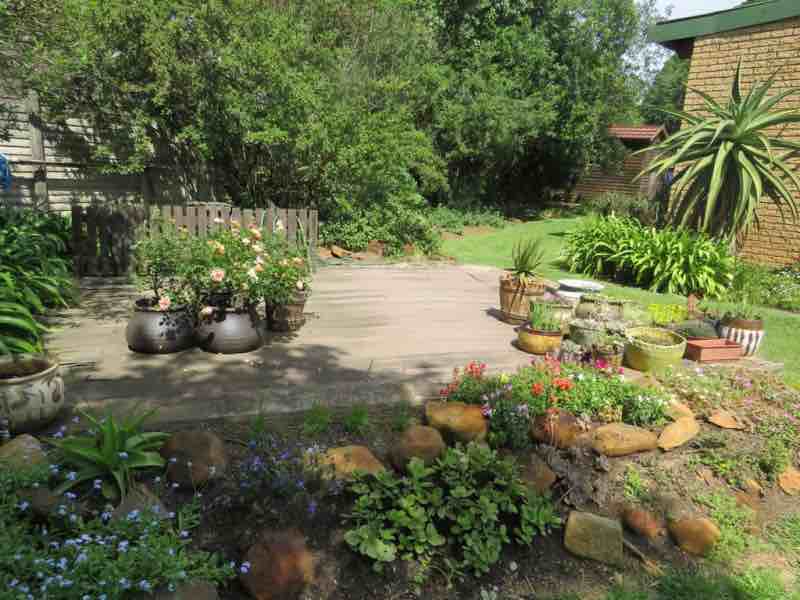 Turn your swimming pool into a reservoir
Turn your swimming pool into a reservoir"There is an intrinsic connection between the wellbeing of the land and our people; impacting everything from food security to climate stability."
Mavuso Msimang, co-founder of African Parks
Pesticide residues
Vegetables and fruit with highest pesticide residues should put the wind up all of us. The malignant blood dyscrasias are scary.
Peace and quiet
William Yeats wrote in his famous poem "The Isle of Innisfree" of the peace he found in his garden with rows of beans and a hive for the honeybee.
When browsing use right click and "Open Link in New Tab" or you may get a bad gateway signal.
The material expressed on this page is gleaned from the nutritional and environmental literature; it is clearly referenced. A plain distinction is made between the author's opinion and that which is scientifically proven. When in doubt consult your health professional.
To suggest a correction or clarification, write to Dr Bernard Preston here. Contact.
Newsletter
Our newsletter is entitled "create a cyan zone" at your home, preserving both yourself and Mother Earth for future generations; and the family too, of course. We promise not to spam you with daily emails promoting various products. You may get an occasional nudge to buy one of my books.
Here are the back issues.
- Lifestyle and ideal body weight
- What are ultra-processed foods?
- Investing in long-term health
- Diseases from plastic exposure
- Intensive lifestyle management for obesity has limited value
- A world largely devoid of Parkinson's Disease
- The impact of friendly bacteria in the tum on the prevention of cancer
- There's a hole in the bucket
- Everyone is talking about weight loss drugs
- Pull the sweet tooth
- If you suffer from heartburn plant a susu
- Refined maize meal and stunting
- Should agriculture and industry get priority for water and electricity?
- Nature is calling
- Mill your own flour
- Bake your own sourdough bread
- Microplastics from our water
- Alternative types of water storage
- Wear your clothes out
- Comfort foods
- Create a bee-friendly environment
- Go to bed slightly hungry
- Keep bees
- Blue zone folk are religious
- Reduce plastic waste
- Family is important
- What can go in compost?
- Grow broad beans for longevity
- Harvest and store sunshine
- Blue zone exercise
- Harvest and store your rainwater
- Create a cyan zone at your home
Did you find this page interesting? How about forwarding it to a friendly book or food junkie? Better still, a social media tick would help.
- Homepage
- Our green garden
Address:
56 Groenekloof Rd,
Hilton, KZN
South Africa
Website:
https://www.bernard-preston.com